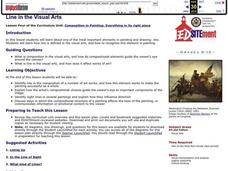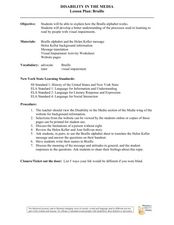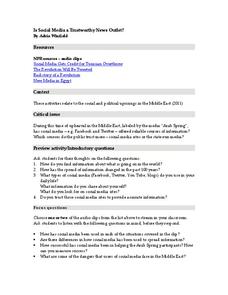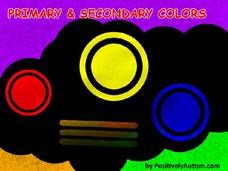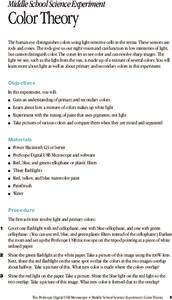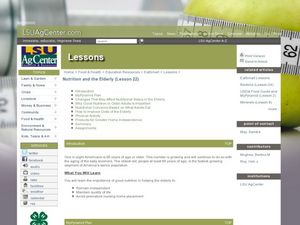Curated OER
Follow the Leader: Line in the Visual Arts
Learners explore line in painting and drawing and examine how it is defined in the visual arts. Recognizing line in the composition of a number of art works and how it affects these works of art is the focus of this lesson.
Curated OER
The Federalist Debates: Balancing Power Between State and Federal Governments
Students examine the pros and cons of state sovereignty vs. federalism, as argued by the Founding Fathers. They identify the basic positions of each side, complete a worksheet, and write a persuasive essay arguing for Jefferson or Hamilton.
Curated OER
Pictures in Words: Poems of Tennyson and Noyes
Middle schoolers examine how Tennyson and Noyes use words to paint vivid pictures. They read and analyze two poems, complete an online scavenger hunt, complete a worksheet, and write examples of alliteration, personification, metaphor,...
Curated OER
Girls Around the World: Communicating Through First-Person Narratives
Teams select a society to investigate and create a chart comparing and contrasting the status of girls in that society with their own. They then craft and illustrate a personal narrative written from the point of view of a girl living in...
Curated OER
Sensational Seaweed
Students compare kelp and land plants. In this sea plant lesson, students look at the role of algae in aquatic environments. They research the properties of kelp and explore seaweed.
Curated OER
Disability in the Media Lesson Plan: Braille
Students determine the workings of the Braille alphabet and how people with visual impairments learn how to use it. In this Braille activity, students study the associated vocabulary, read about Helen Keller, and complete associated...
Curated OER
Regolith Formation
Students explain the difference between regolith formation on Earth and the Moon. In this space science lesson, students model the different factors affecting regolith formation on Earth. They identify the different types of weathering.
Curated OER
Is Social Media a Trustworthy News Outlet?
Examine the role of social media in social and political uprisings. Pupils listen to NPR audio clips about social media and the Arab Spring and read an article that proposes the idea that revolution will not happen through social media....
BioEd Online
Muscles and Bones: Nutrition
Got milk? Or almonds, sardines, or tofu? Calcium is important throughout life, but especially so for developing bodies. If teens do not consume enough calcium while they are growing, they are at a much higher risk of osteoporosis and...
BioEd Online
Muscle Fibers
What better way to learn about muscle than by dissecting one? Using cow muscle (beef), learners compare bundles of yarn to muscle fibers as they explore each. The supplemental reading about astronauts losing muscle mass in space and what...
Baylor College
Heart and Circulation: Pre- and Post-Assessments
Middle schoolers demonstrate what they know about the structure and function of the heart and blood vessels. A set of 15 multiple-choice questions also addresses how the heart handles microgravity and how animals without...
Curated OER
Pretend Memoirs
Elementary schoolers explore the concept of a memoir. The teacher tells a story from his/her childhood as an example of what a memoir is; a written account of one's past. The kids are asked to pretend that they are now adults, and are...
K12 Reader
Self Reflection
After reading a short passage about self reflection, individuals are asked to restate the main ideas in the article in their own words.
Positively Autism
Primary and Secondary Colors
Red, yellow, blue. Orange, purple, green. Introduce kids to primary and secondary colors with a series of videos and a 19-slide presentation that shows how mixing primary colors produces secondary colors.
NASA
Launch Altitude Tracker
Using PVC pipe and aquarium tubing, build an altitude tracker. Pupils then use the altitude tracker, along with a tangent table, to calculate the altitude of a launched rocket using the included data collection sheet.
Curated OER
Quilting
Students use a monochromatic palate, select shades and tints for a selected hue, or select complimentary or analogous colors for a quilt design. They design quilt squares using basic geometric shapes, repetition, balance, and proportion.
Curated OER
Exploring Learned and Innate Behavior
Students explore the differences between learned and innate behavior among humans and monkeys. They complete an assignment and read articles about two studies, which used similar test methods to show that infants and monkeys share an...
Curated OER
The World's Fair of 1893: A Tribute to Agriculture and Advertising
Students identify connections between agriculture, advertising, and mail order catalogues during 1890s as expressed at World's Fair of 1893. Students interpret photographic exhibit and discuss how reactions of rural fair visitors...
Curated OER
Color Theory
Students are able to gain an understanding of primary and secondary colors. They are able to explore about how a mixture of colors makes up white light. Students are able to experiment with the mixing of paint that uses pigments, not...
Curated OER
Jewish Folk Song: Ya Ba Bom
Singing is a wonderful way to express an idea of any kind. This lesson is written expressly for use in directing a high school chorus. They work on using four-part harmony, expression, and melodic intervals while singing a Jewish folk...
Curated OER
Facts of the Union
Middle schoolers review and analyze major topics presented by President Bush during his 2007 State of the Union Address. They generate research questions surrounding the president's claims and calls to action. They then research...
Curated OER
Lesson: After Nature: Dystopia and Detournement
Werner Herzog's film, Lessons of Darkness is the topic of this instructional activity on art, politics, and culture. Learners discuss the concepts of utopia, dystopia, detournment, and Scorched Earth then compose a paper which describes...
Houghton Mifflin Harcourt
Songwriting Skill - Elaboration: Jesse McCartney - “How Do You Sleep?”
The practice of developing lyrics by elaborating with sensory details and examples continues in the third lesson on songwriting. This time class members examine Jesse McCartney's "How Do You Sleep?" Using procedures established in the...
Curated OER
Nutrition and the Elderly
Study the nutrition of elderly people and how it helps them to remain independent and healthy. Learners investigative the nutrition concerns of the elderly. MyPlate, vitamine requirements and sensory changes in the elderly are...


